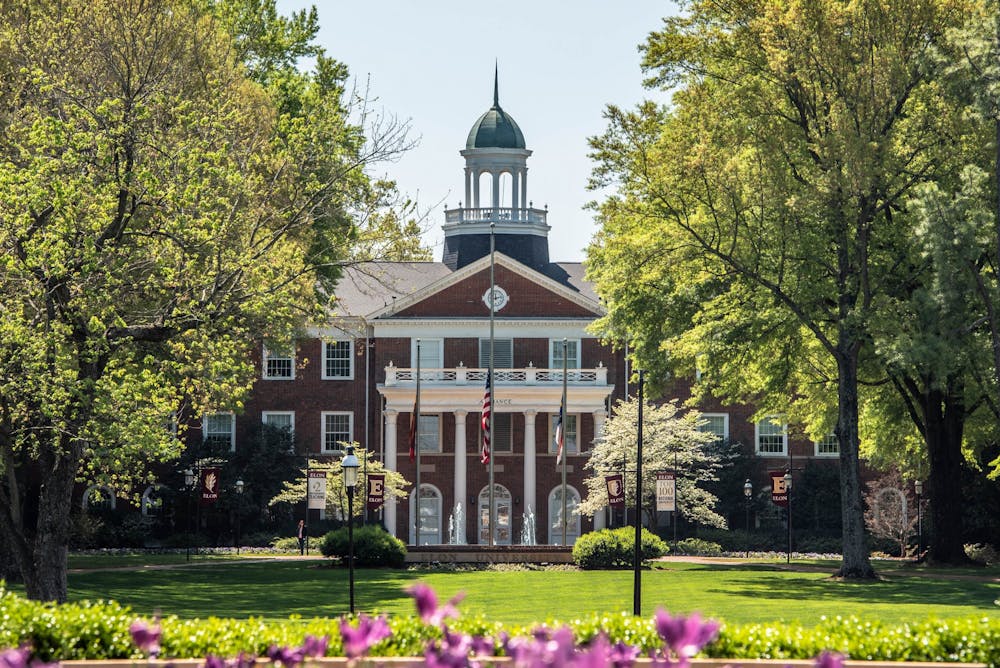Updated April 28, 2020, at 11:12 a.m. to include information on fund distribution.
In response to the strain put on higher education institutions because of the coronavirus, Elon University was allocated over $2.9 million in federal aid, half of which is required to be used for emergency student relief.
More than $6 billion of federal funds are being distributed to colleges and universities to provide emergency cash grants to students whose education and lives have been disrupted by the coronavirus.
The Higher Education Emergency Relief Fund, part of the Coronavirus Aid, Relief and Economic Security Act, provides nearly $14 billion to support students and institutions of higher education, according to a press release.
Owen Covington, director of Elon University’s News Bureau, said in a statement “the CARES Act is a welcome measure of support for those Elon University students whose needs are the greatest.”
Institutions can receive emergency student relief based on a formula outlined in the CARES Act, which looks at the number of full-time students who receive the Pell-grant — a grant for low-income students as determined by the Free Application for Federal Student Aid — as well as total population of the university and the number of students not enrolled online full-time, before the coronavirus outbreak.
While the allocation formula determines how much money an institution is eligible to receive, institutions still have to apply for the funding online.
The fund provides aid to students in the form of cash grants. These grants are meant to help with expenses such as course materials, technology, food, housing, healthcare and childcare — many resources students lost in the transition off-campus and online.
According to Covington, the $1.49 million for student assistance will be distributed by the Bursar’s Office “based on student information on file with the university’s financial aid office.”
The first students to receive federal funding will be those who have been awarded the Pell grant, Covington said. The remaining funds will then be distributed to the students with the highest financial need. Under the guidelines from the federal government, any student who has filed FASFA is eligible for funds, as well as students who have not filed but are eligible to file. The criteria to participate in programs such as the HEERF include, but are not limited to: U.S. citizenship, a valid social security number, selective service registration for male students and a high school diploma, or proof of completion.
“Decisions are still being made about which Elon students are eligible under federal law to receive the money and how it will be allocated,” Covington said. “There is not an application process, but Elon’s Financial Aid office will be involved in determining the eligibility and individual student allocations.”
The payments are meant to offset costs that students incurred due to the pandemic, such as travel, housing or other unexpected expenses. The funds will be distributed via direct deposit or checks.
CARES Act funding will come to Elon University in two segments – one designated for emergency assistance grants for students and the other to offset pandemic-related costs to the institution, such as supplies, operations or personnel costs. Universities and colleges are not yet allowed to apply for the institutional assistance funds.
Covington said the university is not prepared to say anything beyond their original statement.
Asha Banerjee, a policy analyst for the Center for Law and Social Policy, said the coronavirus is deepening existing inequities in higher education. Because of the way the allocation formula distributes aid, many community colleges will receive less federal aid than four-year universities because they do not have as many full-time students enrolled.
“Students with low income, students of color, first generation students, working students — before this crisis really struggled to get the resources they needed, not only to complete their education, but to really succeed and thrive. Now with the pandemic the situation has just gotten so much worse,” Banerjee said.
In addition to part-time students, the CARES Act also does not grant funding to undocumented students, students protected under Deferred Action for Childhood Arrivals and international students. The criteria to participate in programs such as the HEERF include, but are not limited to: U.S. citizenship, a valid social security number, selective service registration for male students and a high school diploma, or proof of completion.
“It was clearly not a perfect system,” Banerjee said. “It left out a lot of students, and even the students that it is meant for, that money still hasn’t reached. Clearly implementation has been a big problem.”
Elon has 134 international students, according to the registrar’s report. Covington said while international students are ineligible to receive the emergency funding due to federal regulations, Elon students who are in need of emergency financial needs can apply for assistance through the university’s Chaplain’s fund.
According to Banerjee, as of April 20, only 1% of the money allocated for student funds had been received by institutions of higher education to distribute funds to students. According to Covington, the university applied for funding last week and received notice from the federal government that Elon has access to the funds. Many institutions have not yet applied for aid or in some cases, such as with Harvard University, Princeton University and Stanford, have rejected aid altogether.
“It's important to recognize the universities are also under a lot of stress,” Banerjee said. “Administration staff has to now deal with an unprecedented crisis, dealing with sending students home and moving classes online are really tricky situations, but at the same time, universities do have a responsibility to their students.”


